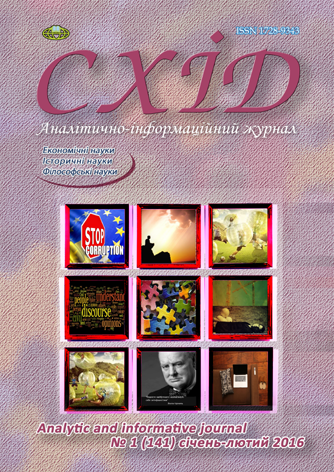Theoretical and methodological principles of anti-corruption philosophical and educational concept
DOI:
https://doi.org/10.21847/1728-9343.2016.1(141).64305Keywords:
Higher education, philosophy of education, corruption, competence, reformAbstract
The article considers the reasons for the spread of corruption in higher education inUkrainefrom analytical and philosophical points of view. Nowadays the higher education ofUkraineis in critical condition. Despite the attempts to make reforms and use the successful experience of other countries we are still lagging behind and may remain in this condition forever.
The Ukrainian society is actually in a "legalized falsification" of higher education. This is reflected in the mass, formal legalization for issuing diplomas to persons who graduate from higher education institutions without gaining real competence. The indicators of such falsification in the modern domestic higher education are the facts that desirable marks are put by demand, course papers, bachelor's and master's theses are written by request. In the modern Ukrainian country the cult of a diploma of higher education is more important than the real knowledge which makes it possible to develop a professional and general life career the civilized world.
Corruption inUkraineis an extremely dangerous and vicious phenomenon which has permeated all the structures and cells of the social organism. It has entrenched in most areas of social life, it is increasing social tension, raising uncertainty about the ability of public authorities to take organizational and practical measures to overcome the systemic crisis. At the international level,Ukrainehas gained the reputation of an extremely corrupt country, which is evidenced by its consistently high ranking in terms of corruption.
Corruption in education is generated and distributed primarily by the defects of social relations, the key role in them belonging to the state as an institution of public authorities. That lack of a real democratic and legal state inUkraineleads to systemic causes of the escalation of corruption in the Ukrainian society and spreading this dangerous disease to epidemic proportions.
So there is a burning question of whether public authorities and the Ukrainian society are capable to make reforms in the higher education system as the ways and means for this are well known.Downloads
References
Berehova H. D. (2012), Educational potential of philosophical knowledge in the system of higher agricultural education in Ukraine, Aylant, Kherson, 312 p. (ukr).
Riabchenko V. I. (2015), UkraineHigh Schoolin civilizational context: socio-philosophical analysis of ideological positions, competence approach, Fitosotsiotsentr, Kyiv, 674 p. (ukr).
Moskalyk H. F. (2014), The philosophical paradigm of modernization of education in information and communication environment, Khrystyianska zoria, Kremenchuh, 328 p. (ukr).
Myhalchenko M. (2010), Corruption in Ukraine: political and philosophical analysis, IPiEND, Kyiv, 615 p. (ukr).
Klitgard R., Maclean-Aboroa R. (2004), Corrupt cities: practical guide and prevention, institute for Contemporary studies, Oakland, California, p. 84-85 (eng).
Stepko M. F. (2012), Modern trends in Higher Education: opportunities and feasibility of their implementation in Ukraine, Pedahohichna ta psykholohichna nauky v Ukraini, Vol. 5, Vysha shkola, Pedagogichna dumka, Kyiv, p. 43-44 (ukr).
Coleman J. (2012), Social Capital in the Creation of Human Capital, American Journal of Sociology, Vol. 94, p. 95-120 (eng).
Babenko K. A., Lazarenko S. Zh. (2006), Corruption in higher education: the nature, causes and consequences, available at: http://www.dy.nayka.com.Ua/?op=1@z=812 (ukr).
Serohin S. M. (2010), Mechanisms to prevent and combat corruption in public authorities, in: Publichne upravlinia: teoriya ta praktyka: zbirnyk naukovykh prats Asotsiatsii doktoriv nauk z derzhavnoho upravlinia, Vol. 1, Kyiv, p. 134-140 (ukr).
HrinovaI.(2011), Research corruption processes in higher education, Visnyk Knyzhkovoi palaty, Vol. 11, p. 1-3 (ukr).
Senchukova L. O., Gegechkori O. N. (2009), Corruption in Higher Education: Causes, Consequences, counter mechanisms, available at: http://www.Klgtu.ru/science/magazine/2009_16/22.dos (rus).
Panchenko P. (2005), Corruption in educational institutions: the offenses and the ratio of criminal acts, Ugolovnoye pravo, Vol. 2, p. 52-53 (rus).
Zahirniak M. V. (2012), The problem of corruption in higher educational institutions ofUkraine, available at: http://www. fulbright.org.ua/62_8_u.html (ukr).
Zabroda D. H. (2013), The state anti-corruption policy inUkraine: theory, legal framework, institutionalization, Dnipropetrovsk, 367 p. (ukr).
Pyshchulina O. (2004), Features combating corruption in higher education, Vol. 3, Politychnui menedzhment, p. 112-122 (ukr).
Corruption in higher education (2011), Demokratychni initsiatyvy, Kyiv, p. 4-7 (ukr).
Allak Zh., Puasson M. (2014), Corrupt schools, corrupt universities: What can be done?, Kiyev, p. 24 (rus).
Downloads
Published
How to Cite
Issue
Section
License
Copyright (c) 2016 Eugene Vdovychenko

This work is licensed under a Creative Commons Attribution-NonCommercial-NoDerivatives 4.0 International License.
1. Authors bear responsibility for the accuracy of facts, quotations, numbers and names used.
2. Manuscripts are not sent back.
3. The publisher does not always agree with the authors' opinion.
4. The authors reserve the right to authorship of the work and pass the first publication right of this work to the journal under the terms of a Creative Commons Attribution-NonCommercial-NoDerivatives 4.0 International License. This license allows others to distribute (copy) the published work for non-commercial purposes, provided there is mandatory attribution to its authors and a link to the first publication in our journal.
5. The authors have the right to conclude separate supplement agreements that relate to non-exclusive work distribution in the form in which it has been published by the journal (for example, to upload the work to the online storage of the journal or publish it as part of a monograph), provided that the reference to the first publication of the work in this journal is included.

